

|
 |
Hunt (The) AKA Jagten (Blu-ray)
[Blu-ray]
Blu-ray B - United Kingdom - Arrow Films Review written by and copyright: Paul Lewis (9th August 2017). |
|
The Film
 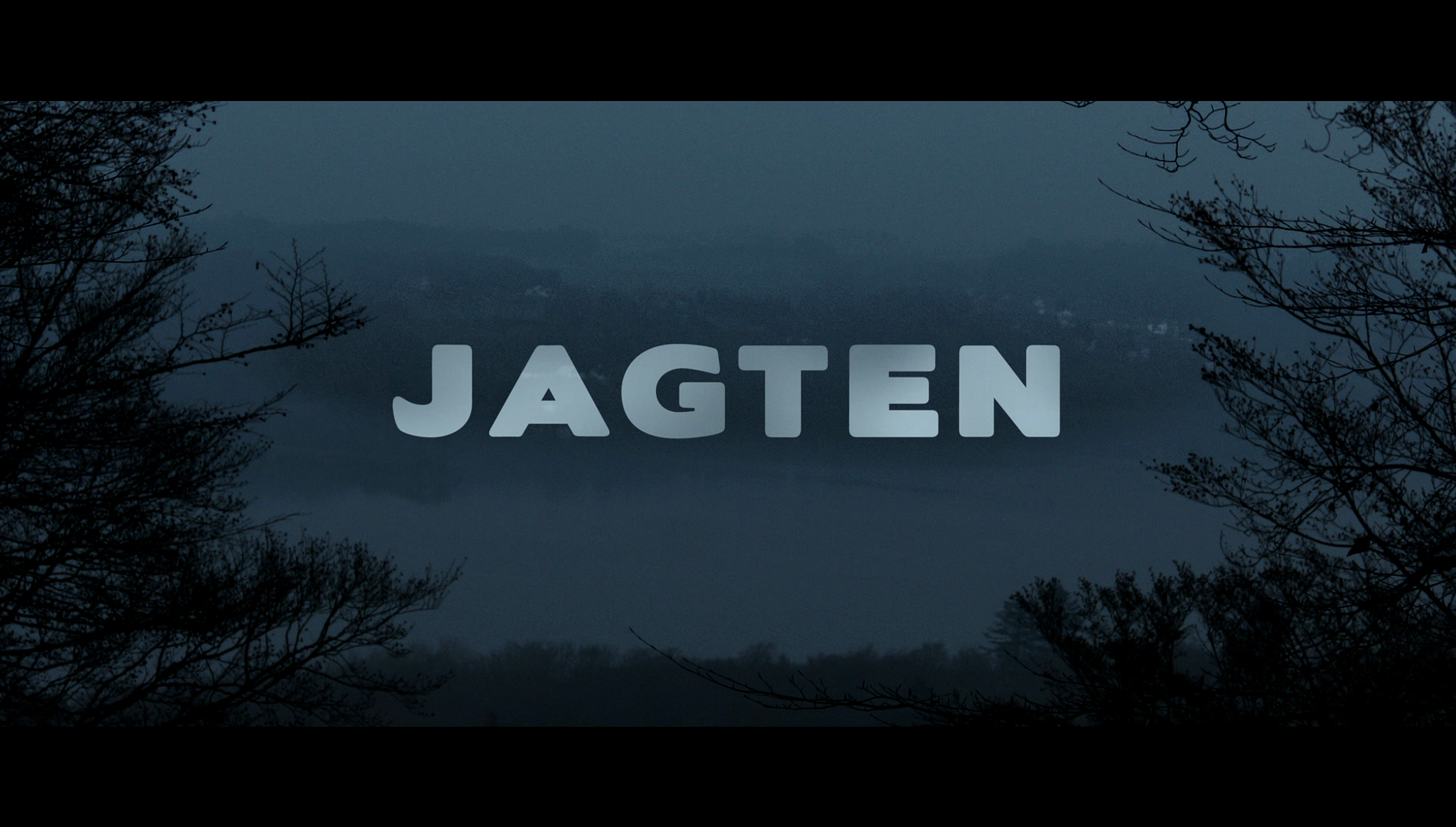 The Hunt (Thomas Vinterberg, 2012) The Hunt (Thomas Vinterberg, 2012)
Following his divorce, forty-two year old former schoolteacher Lucas (Mads Mikkelsen) has taken up a new position at a nursery school in a small Danish town. Popular with the children, Lucas is also friends with many of their parents, who are mostly of a similar age to himself. However, Lucas is involved in a messy battle with his ex-wife Kirsten over the custody of his teenaged son Marcus. Kirsten mocks Lucas’ job as a nursery school teacher, and insists that Lucas may only see his son once every other weekend. One day, whilst visiting the local shops, Lucas sees five year old Klara (Annika Wedderkopp), the daughter of Lucas’ friend Theo (Thomas Bo Larsen). Klara has run away from home. Lucas returns Klara to her parents. It seems that Klara and her older brother Torsten (Sebastian Bull Sarning) have very little parental supervision, and that evening Torsten is with a friend, looking at pornography on a tablet computer. Torsten briefly shows the tablet screen to Klara, his friend joking about the pornographic actor’s penis, which he compares to a ‘rod’. The next day, Lucas passes the home of his friend Theo and sees Klara outside. The voices of Theo and his wife can be heard coming from inside the house: they are arguing loudly. Klara is waiting for her parents to take her to nursery; Lucas offers to take her instead. Alienated from her own turbulent home life, Klara responds warmly to Lucas’ kindness. At nursery school, Klara makes a love heart for Lucas out of beads. She leaves it in the pocket of his jacket. Later, during play she kisses him on the lips. Lucas reminds Klara gently that kisses on the lips should be saved for her parents, and he also advises her to give the heart she made to her mother or father – or perhaps one of her peers at the nursery. 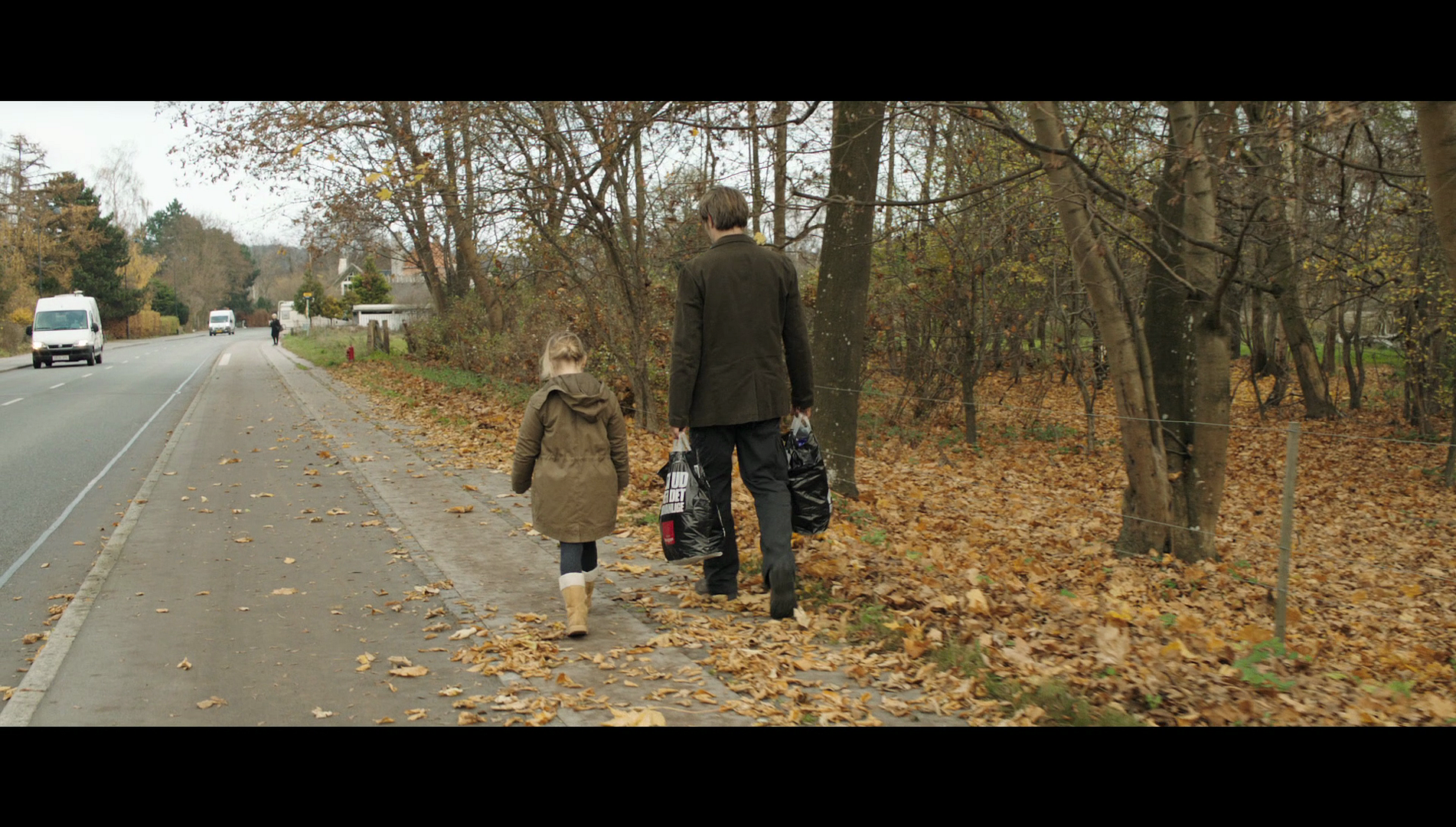 Dejected, Klara remains in the nursery at the end of the day. When the manager of the nursery, Grethe (Susse Wold), asks Klara why she is so sad, Klara tells Grethe ‘I hate Lucas. He’s stupid and he’s ugly. And he has a willie [….] His is pointing straight out, like a rod’. Her words, of course, echo those of her brother and his friend when they were watching the pornographic film on the tablet computer at home, but Grethe begins to suspect that Klara may have been abused sexually by Lucas. Dejected, Klara remains in the nursery at the end of the day. When the manager of the nursery, Grethe (Susse Wold), asks Klara why she is so sad, Klara tells Grethe ‘I hate Lucas. He’s stupid and he’s ugly. And he has a willie [….] His is pointing straight out, like a rod’. Her words, of course, echo those of her brother and his friend when they were watching the pornographic film on the tablet computer at home, but Grethe begins to suspect that Klara may have been abused sexually by Lucas.
Lucas discovers that his son Marcus has told Kirsten that he would rather live with Lucas than with Kirsten, and Lucas makes preparations for Marcus’ arrival. Lucas also begins a relationship with the sexually confident Polish cleaner at the nursery, Nadja (Alexandra Rappaport). His life seems to be turning a corner, until Grethe confronts Lucas about what Klara has said. Lucas is advised to take some time off work, and Klara is interviewed by child psychologist Ole (Bjarne Henriksen). Using leading questions, Ole teases from Klara a suggestion that Lucas encouraged the child to touch his penis. Grethe notifies Klara’s parents, and she also informs the parents of the other children at the nursery that an allegation of abuse has been made against Lucas. She suggests to these parents that if their child experiences any ‘symptoms’ of abuse such as bedwetting or nightmares – which are of course also natural experiences of children who are not abused – they must let her know immediately. Inevitably, a number of the parents inform Grethe that their children have also experienced these ‘symptoms’, and this is taken as an index of more widespread abuse conducted by Lucas. Grethe also informs Kirsten, and Marcus is told to stay away from his father. However, against his mother’s orders Marcus visits Lucas. He stays with his father but also finds himself to be ostracised by the community and even physically attacked by one of the parents, Johan (Daniel Engstrup). 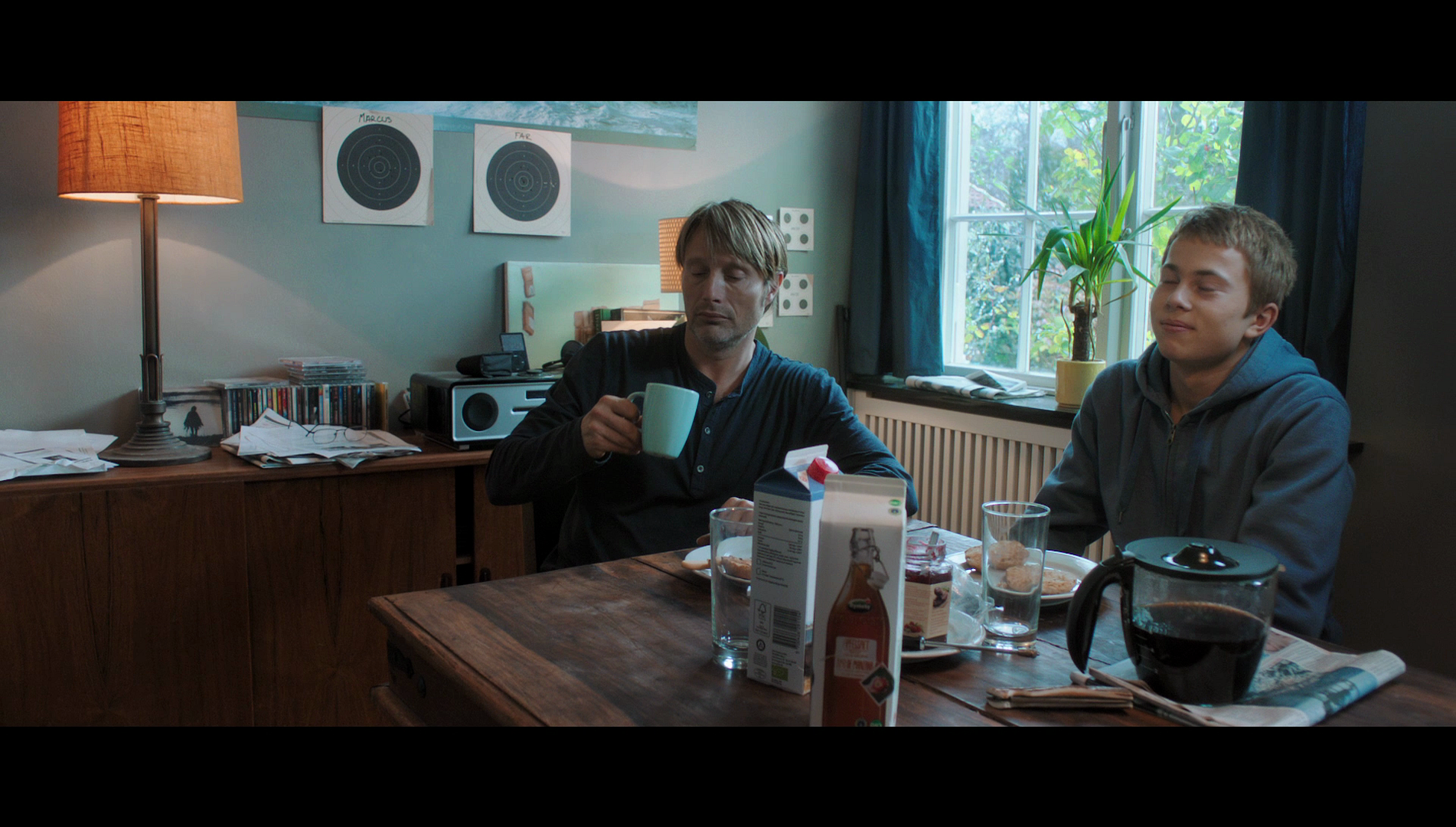 Eventually, Lucas is arrested by the police. He is held in custody but quickly released once the police discover a flaw in the accusations: the children describe a basement in which Lucas was said to abuse them, but Lucas’ house has no basement. Nevertheless, despite the fact that he has been cleared of any wrongdoing, Lucas still finds himself to be the subject of accusations and attacks by his former friends. These escalate to the point that Lucas sends Marcus back to live with Kirsten, and things come to a head on Christmas Eve with a confrontation between Lucas and Theo at the local church’s Christmas service. Eventually, Lucas is arrested by the police. He is held in custody but quickly released once the police discover a flaw in the accusations: the children describe a basement in which Lucas was said to abuse them, but Lucas’ house has no basement. Nevertheless, despite the fact that he has been cleared of any wrongdoing, Lucas still finds himself to be the subject of accusations and attacks by his former friends. These escalate to the point that Lucas sends Marcus back to live with Kirsten, and things come to a head on Christmas Eve with a confrontation between Lucas and Theo at the local church’s Christmas service.
The early scenes of Thomas Vinterberg’s The Hunt (2012) go to great lengths to portray Lucas as a kindly man, loved by the children for whom he cares at the nursery. We see him arriving at work, the children hiding in anticipation of his arrival and jumping out at him. He allows himself to be mobbed by them, picking up one of the children. (‘Watch out, I’m dangerous’, he jokes, in a line that will find added resonance once Klara accuses him of molesting her.) He takes one of the little boys to the lavatory, caring for the child as he struggles to wipe his bottom after defecating. However, in his personal life Lucas is desperately sad, seeking to reconnect with his son Marcus despite the protestations of ex-wife Kirsten. ‘My dad says you’re sad because you live alone in a big house’, Klara tells Lucas near the start of the film. However, Lucas’ sadness is to do with the lack of contact with Marcus. Finally, when Lucas’ life seems to be turning around – Marcus tells Kirsten that he wishes to live with Lucas instead of with her, and Lucas begins a new relationship with Nadja – Lucas is subjected to the accusations of Klara and the dubious investigation of Grethe and Ole. 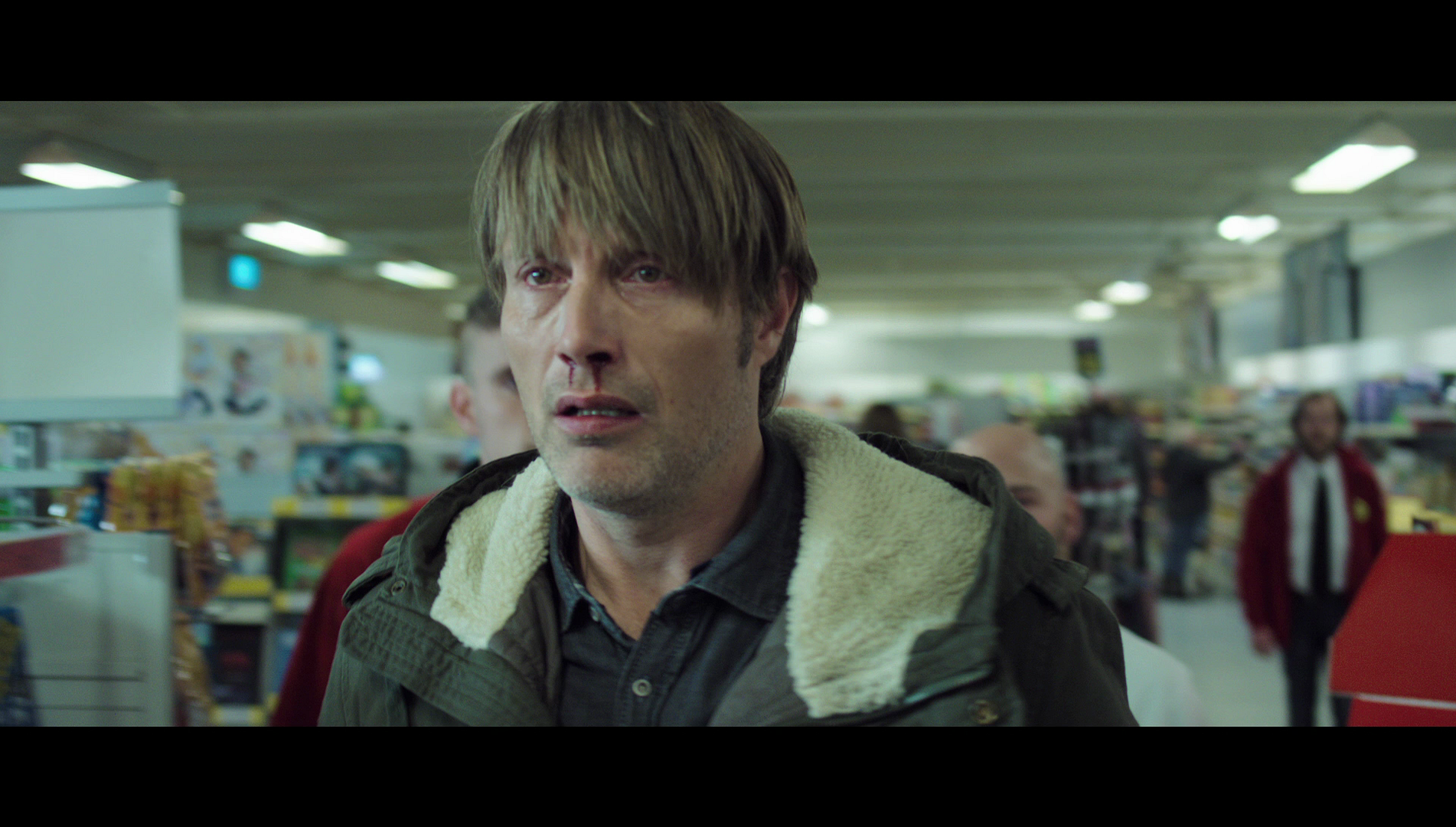 In the way in which the community turns against Lucas, there are subtle echoes of Sam Peckinpah’s 1972 film Straw Dogs and the lynch mob that Tom Hedden (Peter Vaughan) orchestrates against Henry Niles (David Warner) following the death of Tom’s daughter Janice (Sally Thomsett), for which Niles is assumed to be guilty. The story of a modern-day witch-hunt, and the hysteria which follows accusations that, initially, nobody believes but which build up a consensus as they escalate, in its structure The Hunt seems deliberately to parallel the structure of Arthur Miller’s 1953 play The Crucible. Miller’s play, of course, centred its narrative on the Salem witch trials of 1692 but was openly allegorical of the era of McCarthyism in which it was written. Like John Proctor in Miller’s play, Lucas is a righteous man who finds himself in a deeply unrighteous situation. Lucas’ accuser is much younger than Proctor’s, however. Nevertheless, it’s perhaps worth remembering that at the time of the Salem witch trials, the real Abigail Williams was only eleven years old, whereas in The Crucible Miller wrote Abigail as a seventeen year old girl so infatuated with John Proctor that she accuses Proctor’s wife Elizabeth of witchcraft; by increasing Abigail’s age, Miller made it easier for the audience of the play to blame Abigail for the Proctors’ fate. In The Hunt, meanwhile, Klara’s age (she is five) makes it impossible to see her as a ‘villain’: the true villain is the climate of judgement and prejudice, and the biased protocols that are put in place to investigate Klara’s claims (ie, the biased and leading method by which both Grethe and Ole question Klara). Like the Proctors’ primary accuser Abigail Williams, Klara accuses Lucas because Lucas is the object of her unrequited love. (In the case of Klara, this amounts to a love heart which she makes out of beads, which Lucas suggests she give to one of the boys in the school or to her parents, and a kiss on the lips, which Lucas gently reminds her is something she should only give her mother or father.) Furthermore, as in Miller’s play, blind faith is invested in the testimony of Klara and the other children, characters on a number of occasions asserting that children simply do not lie. (The first character to assert this is Grethe, who in many ways is the film’s equivalent of the character of Judge John Hathorne in The Crucible; her judgement of Lucas is established immediately after Klara’s disclosure of the alleged abuse, and much to Lucas’ chagrin Grethe spreads the word about Lucas’ presumed molestation of Klara amongst his friends and neighbours and even to his ex-wife and son, working to drive a wedge between Lucas and both his family and friends.) In the way in which the community turns against Lucas, there are subtle echoes of Sam Peckinpah’s 1972 film Straw Dogs and the lynch mob that Tom Hedden (Peter Vaughan) orchestrates against Henry Niles (David Warner) following the death of Tom’s daughter Janice (Sally Thomsett), for which Niles is assumed to be guilty. The story of a modern-day witch-hunt, and the hysteria which follows accusations that, initially, nobody believes but which build up a consensus as they escalate, in its structure The Hunt seems deliberately to parallel the structure of Arthur Miller’s 1953 play The Crucible. Miller’s play, of course, centred its narrative on the Salem witch trials of 1692 but was openly allegorical of the era of McCarthyism in which it was written. Like John Proctor in Miller’s play, Lucas is a righteous man who finds himself in a deeply unrighteous situation. Lucas’ accuser is much younger than Proctor’s, however. Nevertheless, it’s perhaps worth remembering that at the time of the Salem witch trials, the real Abigail Williams was only eleven years old, whereas in The Crucible Miller wrote Abigail as a seventeen year old girl so infatuated with John Proctor that she accuses Proctor’s wife Elizabeth of witchcraft; by increasing Abigail’s age, Miller made it easier for the audience of the play to blame Abigail for the Proctors’ fate. In The Hunt, meanwhile, Klara’s age (she is five) makes it impossible to see her as a ‘villain’: the true villain is the climate of judgement and prejudice, and the biased protocols that are put in place to investigate Klara’s claims (ie, the biased and leading method by which both Grethe and Ole question Klara). Like the Proctors’ primary accuser Abigail Williams, Klara accuses Lucas because Lucas is the object of her unrequited love. (In the case of Klara, this amounts to a love heart which she makes out of beads, which Lucas suggests she give to one of the boys in the school or to her parents, and a kiss on the lips, which Lucas gently reminds her is something she should only give her mother or father.) Furthermore, as in Miller’s play, blind faith is invested in the testimony of Klara and the other children, characters on a number of occasions asserting that children simply do not lie. (The first character to assert this is Grethe, who in many ways is the film’s equivalent of the character of Judge John Hathorne in The Crucible; her judgement of Lucas is established immediately after Klara’s disclosure of the alleged abuse, and much to Lucas’ chagrin Grethe spreads the word about Lucas’ presumed molestation of Klara amongst his friends and neighbours and even to his ex-wife and son, working to drive a wedge between Lucas and both his family and friends.)
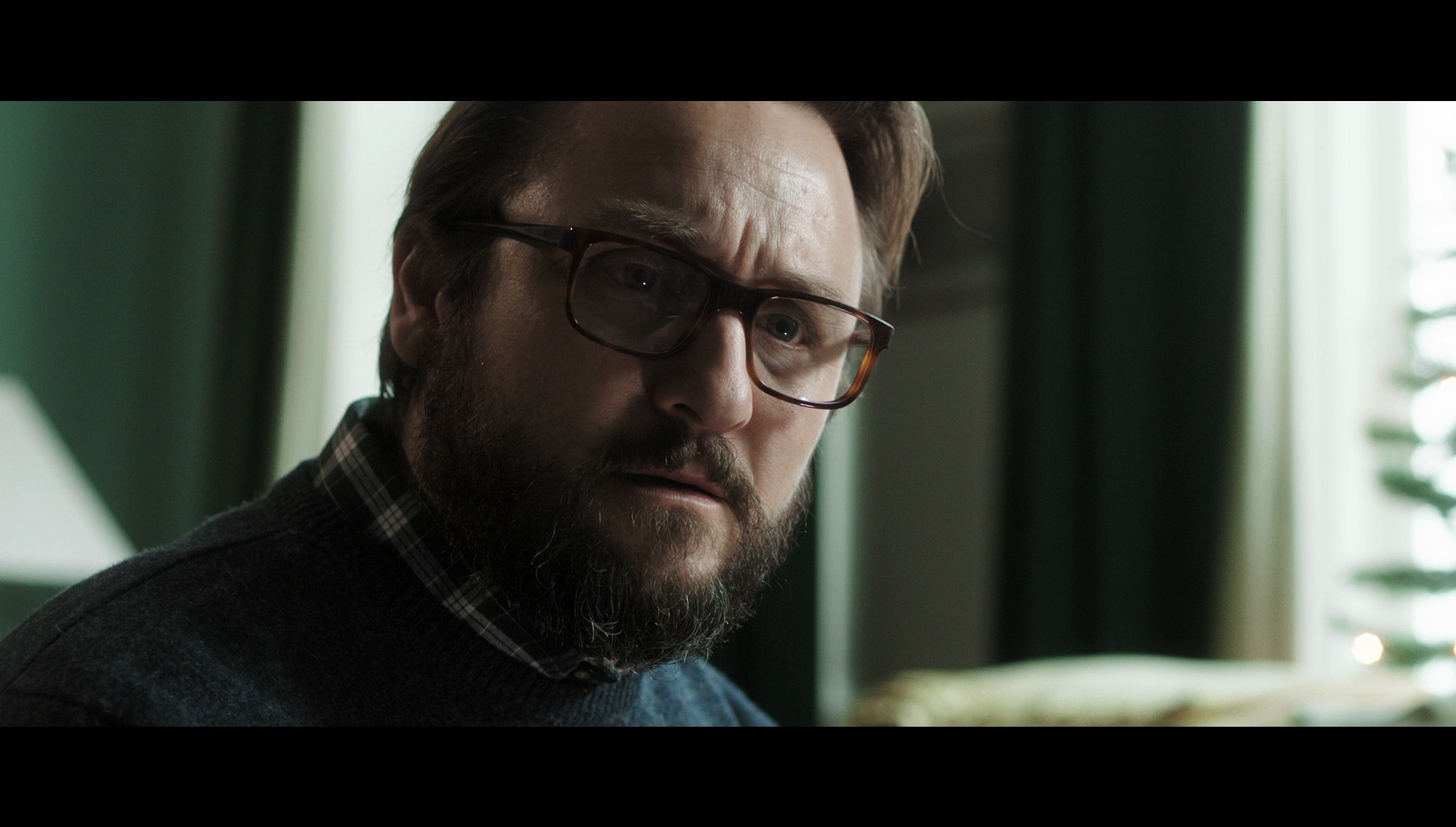 When Klara is interviewed by Grethe and Ole, their methods of questioning are depicted as highly dubious. It’s unclear whether Ole is present in an official capacity, or simply interviews Klara as a favour to Grethe, but regardless of his precise role in the investigation he is guilty of subtly implanting suggestions of abuse in the child, offering her leading questions and suggesting images: Klara’s description of the event is vague, until Ole asks her ‘Did you touch it [Lucas’ penis]? [….] Did something white come out of it?’ In response, Klara nods quietly. The unprofessional method of questioning by Ole and Grethe might be considered unbelievable, but Vinterberg has insisted that this key scene had roots in a real case and was inspired by some notes that he received from a child psychiatrist (Vinterberg, cited in Brooks, 2012: np). The interview scene was apparently based closely on the transcript of a real interview (ibid.). When Klara is interviewed by Grethe and Ole, their methods of questioning are depicted as highly dubious. It’s unclear whether Ole is present in an official capacity, or simply interviews Klara as a favour to Grethe, but regardless of his precise role in the investigation he is guilty of subtly implanting suggestions of abuse in the child, offering her leading questions and suggesting images: Klara’s description of the event is vague, until Ole asks her ‘Did you touch it [Lucas’ penis]? [….] Did something white come out of it?’ In response, Klara nods quietly. The unprofessional method of questioning by Ole and Grethe might be considered unbelievable, but Vinterberg has insisted that this key scene had roots in a real case and was inspired by some notes that he received from a child psychiatrist (Vinterberg, cited in Brooks, 2012: np). The interview scene was apparently based closely on the transcript of a real interview (ibid.).
The accusations against Lucas are unbelievable, but nevertheless a climate of hysteria leads to the characters accepting the suggestion that Lucas has molested Klara and a number of other children. Grethe gives to the parents of the children at the nursery a list of ‘symptoms’ of sexual abuse such as bedwetting and nightmares – all phenomena that children who do not suffer sexual abuse also experience. This of course leads to numerous other accusations of abuse. Eventually, the police arrest Lucas and investigate these allegations. It seems that all of the children describe the same basement in which the abuse allegedly took place, but upon investigation it is clear that Lucas’ house does not even possess a basement. Clearly seeing the allegations as a case of collective hysteria, the police release Lucas. However, even after this Lucas’ friends and neighbours still believe him to be guilty. Both Lucas and his son Marcus are treated cruelly by the locals: when Marcus visits the local supermarket to buy provisions, he is told to leave. Nadja initially dismisses the allegations against Lucas as ridiculous, but she is told by the other women at the nursery that Lucas must have abused the children because he ‘has been alone with children in the toilet and the soft play room’. When Klara knocks on Lucas’ door and offers an apology of sorts, her words suggesting that she has become confused over what happened owing to the methods by which she has been questioned by the likes of Ole (‘They say you did bad things to me [….] I don’t know. I don’t really remember’), Nadja begins to query Lucas’ innocence. ‘Did you touch that girl?’, she asks, ‘You’re not a sick person, are you?’ ‘Do you think I’m insance?’, Lucas asks her desperately before throwing her out of his house. Even Theo, one of Lucas’ closest friends, is quick to believe Klara, insisting to Lucas that children never lie. This is despite the fact that early in the film, Theo points out the subconscious ‘tell’ Lucas has when he attempts to lie. When Lucas speaks with Kirsten on the telephone, Theo asks Lucas how things are progressing between Lucas and his ex-wife and son. Lucas tells Theo that things are ‘Fine’. However, Theo presses Lucas, telling him ‘I can tell when you’re lying: your eye twitches’. 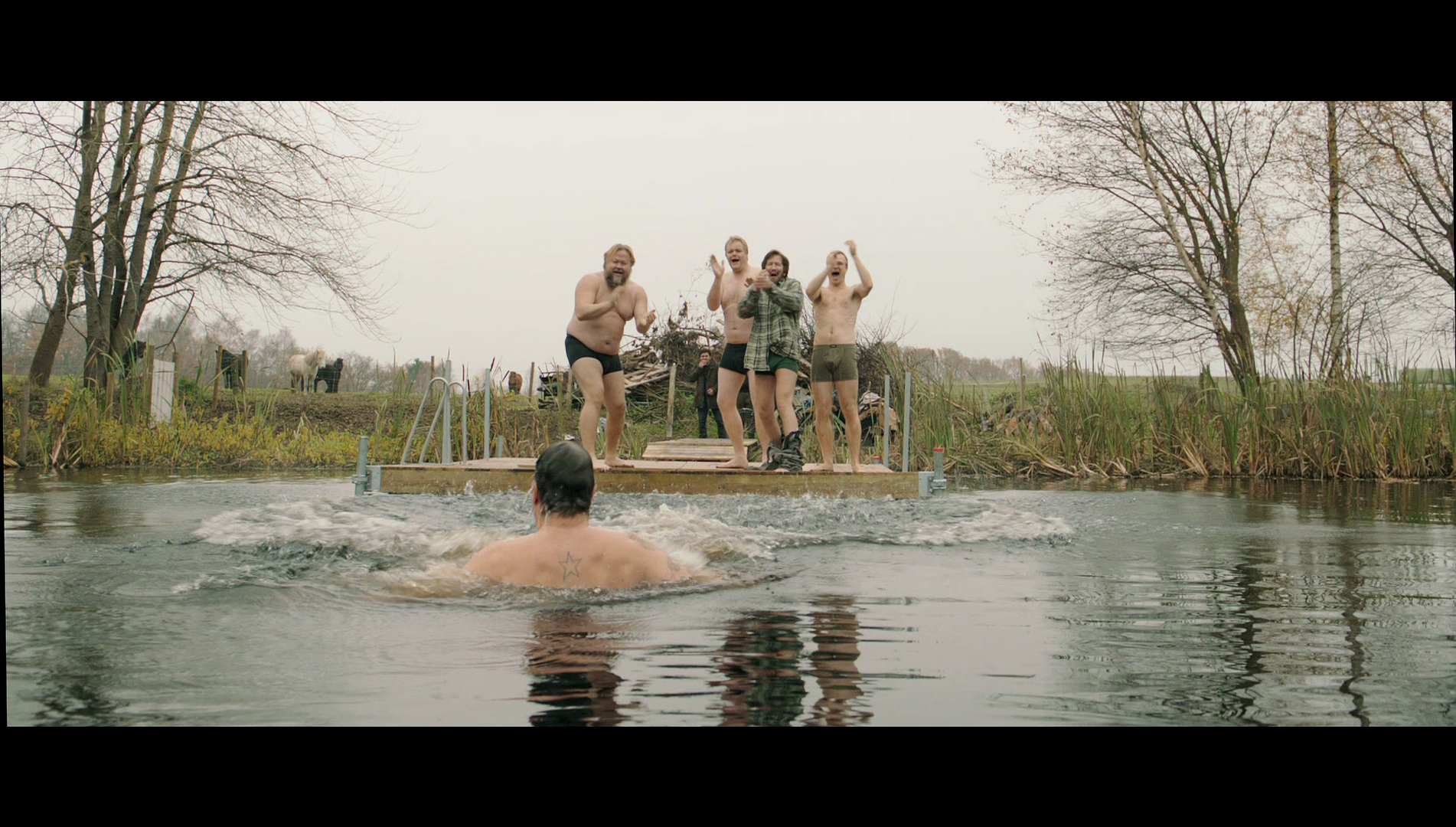 The film begins and ends with scenes of hunting, associating the pursuit of the hunt with displays of masculinity: the opening sequence takes place in November, after Lucas and his friends have been hunting, and in a moment of male bonding and bravado, they dare one another to jump into a freezing river. Their voices are heard over the film’s opening titles, which are presented simply as white text on a black background. (This sound is eventually accompanied by Van Morrison singing ‘Moondance’, underscoring the fact that for Lucas and his friends this is a happy moment, but the lyrics also subtly suggesting the focus on sex and sexuality that will become prevalent as the narrative progresses.) Later in the film, Lucas is shown hunting by himself: alone in the woodland, he sets the sights of his rifle on a stag before killing it. With the meat, he prepares a feast for his friends, including Theo. During the meal, he receives a telephone call from Nadja, who suggests they should meet (as Lucas’ friends behave raucously in the background). After his friends have left, Lucas meets with Nadja and they return to his home, Nadja clearly interested in sex with Lucas; with almost no foreplay or verbal overtures, they consummate their relationship, Lucas’ nervousness gradually slipping away. In this sequence, the hunt is followed by seduction. The film ends on another hunt, and this time, as a ‘rite of passage’ Lucas takes Marcus with him. A shot rings out and a bullet strikes a tree near Lucas’ head; he looks and sees the vague outline of a man holding a rifle, the features obscured by the sunlight, but this figure disappears. The immediate danger of the witchhunt has passed, and Lucas has been reintegrated into the community, but something cruel remains – his relationships with his friends and family will never be the same again. The notion of the ‘hunt’ thus becomes symbolically important to the film. The film begins and ends with scenes of hunting, associating the pursuit of the hunt with displays of masculinity: the opening sequence takes place in November, after Lucas and his friends have been hunting, and in a moment of male bonding and bravado, they dare one another to jump into a freezing river. Their voices are heard over the film’s opening titles, which are presented simply as white text on a black background. (This sound is eventually accompanied by Van Morrison singing ‘Moondance’, underscoring the fact that for Lucas and his friends this is a happy moment, but the lyrics also subtly suggesting the focus on sex and sexuality that will become prevalent as the narrative progresses.) Later in the film, Lucas is shown hunting by himself: alone in the woodland, he sets the sights of his rifle on a stag before killing it. With the meat, he prepares a feast for his friends, including Theo. During the meal, he receives a telephone call from Nadja, who suggests they should meet (as Lucas’ friends behave raucously in the background). After his friends have left, Lucas meets with Nadja and they return to his home, Nadja clearly interested in sex with Lucas; with almost no foreplay or verbal overtures, they consummate their relationship, Lucas’ nervousness gradually slipping away. In this sequence, the hunt is followed by seduction. The film ends on another hunt, and this time, as a ‘rite of passage’ Lucas takes Marcus with him. A shot rings out and a bullet strikes a tree near Lucas’ head; he looks and sees the vague outline of a man holding a rifle, the features obscured by the sunlight, but this figure disappears. The immediate danger of the witchhunt has passed, and Lucas has been reintegrated into the community, but something cruel remains – his relationships with his friends and family will never be the same again. The notion of the ‘hunt’ thus becomes symbolically important to the film.
Throughout the film, there is no doubt that Lucas is innocent. However, little Klara is exposed to a society that is dominated by strange male rituals and characterised by adults’ loaded relationships with their children. In the aforementioned opening sequence, Lucas’ adult peers strip naked before leaping into the freezing river, and at home Klara is exposed to pornography by her yobbish older brother Torstein and his friend, who seem to have unregulated access to the Internet via a tablet computer. (Torstein and his friend’s conversation about the pornographic actor’s penis being like a ‘rod’ is repeated by Klara at the nursery and becomes the core of the accusations against Lucas.) Vinterberg seems to suggest that the cruel situation in which Lucas finds himself grows to some extent out of lazy or absent parenting: in the film, families are either broken (like Lucas’ own) or dominated by bickering. In an early sequence, Lucas discovers Klara alone and near the town’s shops. She has run away from home; Lucas returns Klara to her parents and we discover that this isn’t the first time she has tried to flee from her family. Lucas speaks with Theo and his wife, who seem amiable enough; but when Lucas walks past Klara’s home the next day, she is waiting outside to be taken to nursery whilst inside the house, her parents argue loudly: Klara’s mother is criticising Theo for his unwillingness to walk Klara to the nursery. Hearing this, Lucas walks the child to the nursery himself. Klara seems to have little input from her own parents, and her brother Torstein appears to have no supervision or guidance from Theo or his wife either – hence the fact that Torstein and his friend can watch pornography on the tablet and even show it, however briefly, to Klara. Theo is quick to anger at the suggestion that Klara has been abused by Lucas, but he’s much less interested in parenting his own children. His realisation of this, perhaps, comes at the end of the film when, for the first time in the picture, he speaks softly to his young child. ‘The world is full of evil’, he suggests, ‘But if we hold on to each other, it goes away’. 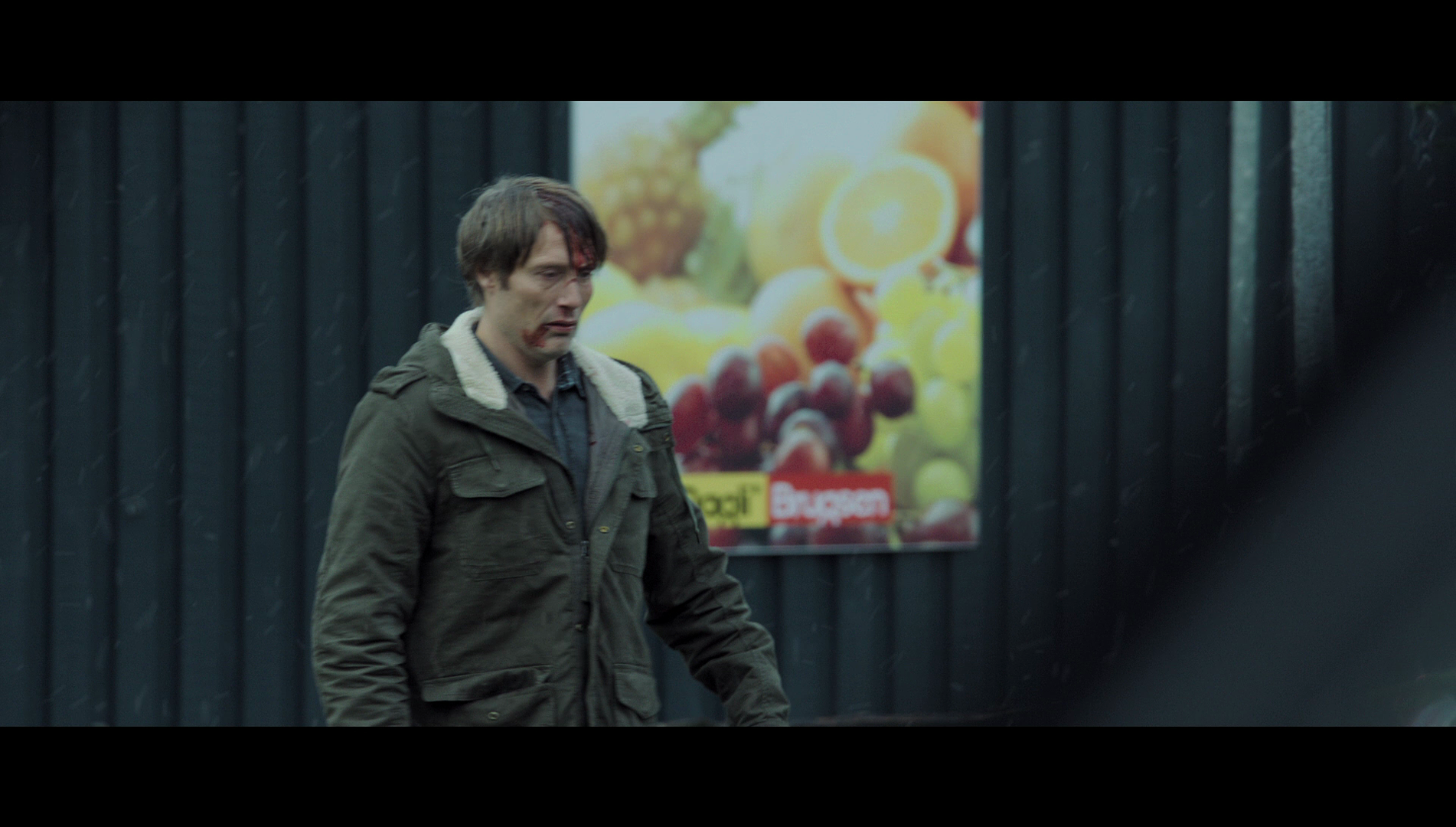 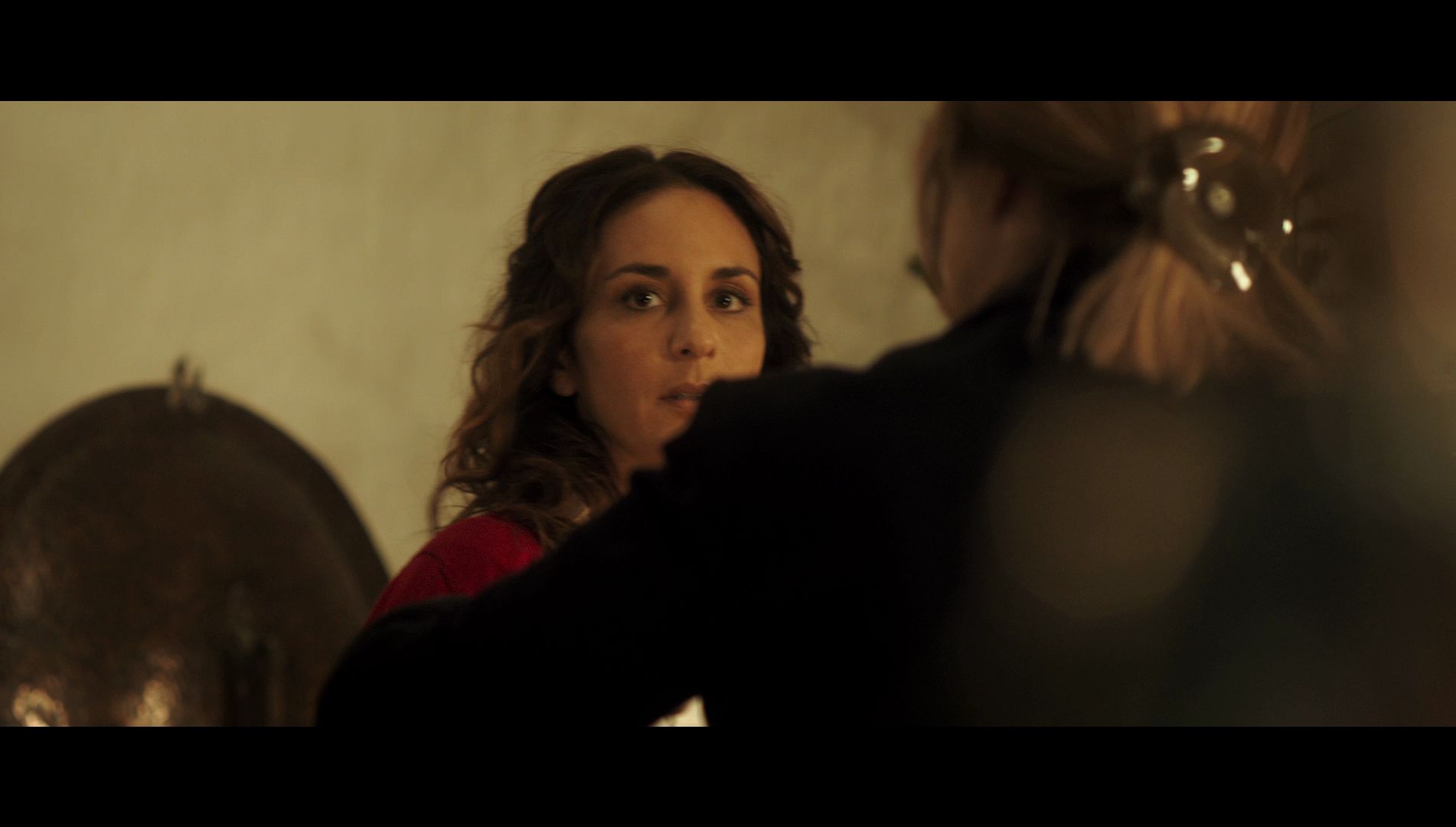 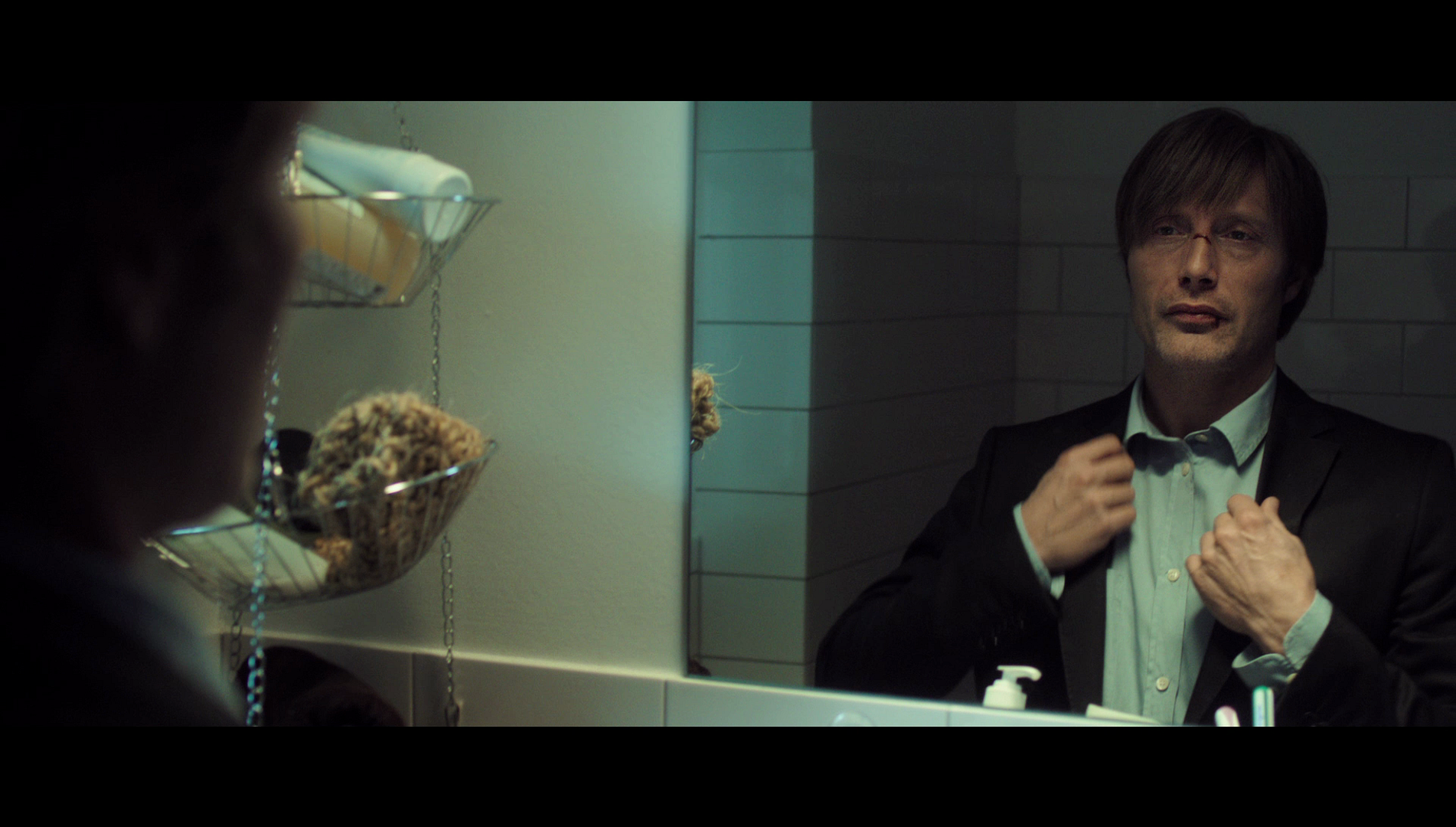
Video
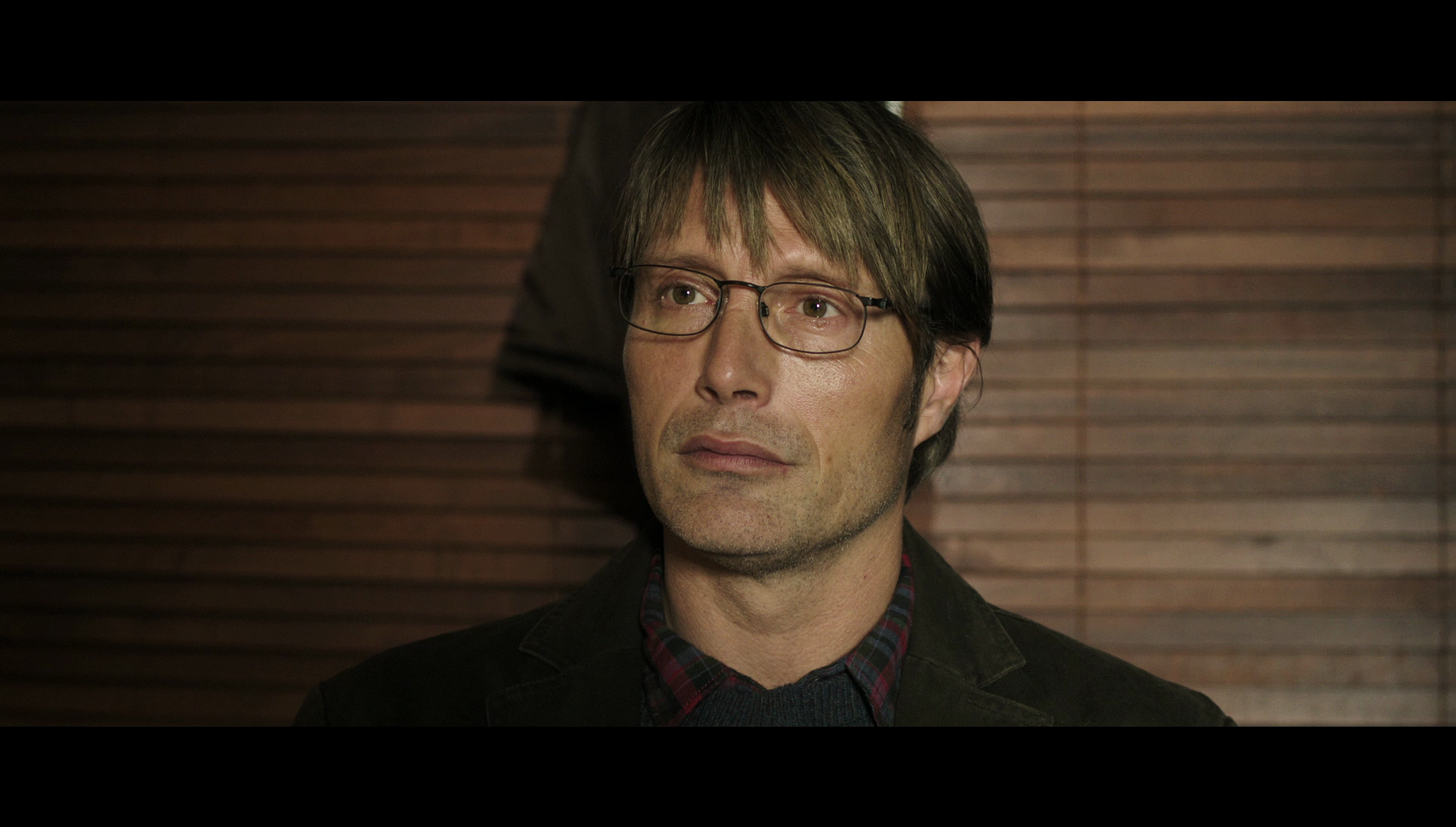 Uncut, with a running time of 115:33 mins, The Hunt is presented in its original aspect ratio of 2.35:1. The 1080p presentation takes up just over 28Gb of space on the Blu-ray disc and uses the AVC codec. The film was shot digitally on the Arri Alexa Plus. This Blu-ray presentation is therefore a compressed digital clone of a digital source. A strong level of detail is present throughout the film, the image having a good sense of depth when required. For a film shot digitally, a strong dynamic range is present, with midtones balanced very nicely and shadows rich and defined. Cooke Panchro lenses were reputedly used on the film; these lenses are often praised for the ‘vintage’ aesthetic they can help to facilitate, and this is emphasised in the film via the use of soft golden light. When Lucas is questioned by Grethe after Klara’s disclosure, Lucas is framed alone and set within a golden light that seems to come from the window behind Grethe; here and elsewhere, the production seems to have avoided panel lighting in favour of directed Fresnel-style lights that taper off at the periphery of the frame. For a film shot digitally, The Hunt has a quite ‘retro’ aesthetic; it’s definitely a far cry from the Dogme 95 films with which Vinterberg was associated at the start of his career as a director. Finally, the encode is solid with no problematic artifacts present within the film. Uncut, with a running time of 115:33 mins, The Hunt is presented in its original aspect ratio of 2.35:1. The 1080p presentation takes up just over 28Gb of space on the Blu-ray disc and uses the AVC codec. The film was shot digitally on the Arri Alexa Plus. This Blu-ray presentation is therefore a compressed digital clone of a digital source. A strong level of detail is present throughout the film, the image having a good sense of depth when required. For a film shot digitally, a strong dynamic range is present, with midtones balanced very nicely and shadows rich and defined. Cooke Panchro lenses were reputedly used on the film; these lenses are often praised for the ‘vintage’ aesthetic they can help to facilitate, and this is emphasised in the film via the use of soft golden light. When Lucas is questioned by Grethe after Klara’s disclosure, Lucas is framed alone and set within a golden light that seems to come from the window behind Grethe; here and elsewhere, the production seems to have avoided panel lighting in favour of directed Fresnel-style lights that taper off at the periphery of the frame. For a film shot digitally, The Hunt has a quite ‘retro’ aesthetic; it’s definitely a far cry from the Dogme 95 films with which Vinterberg was associated at the start of his career as a director. Finally, the encode is solid with no problematic artifacts present within the film.
 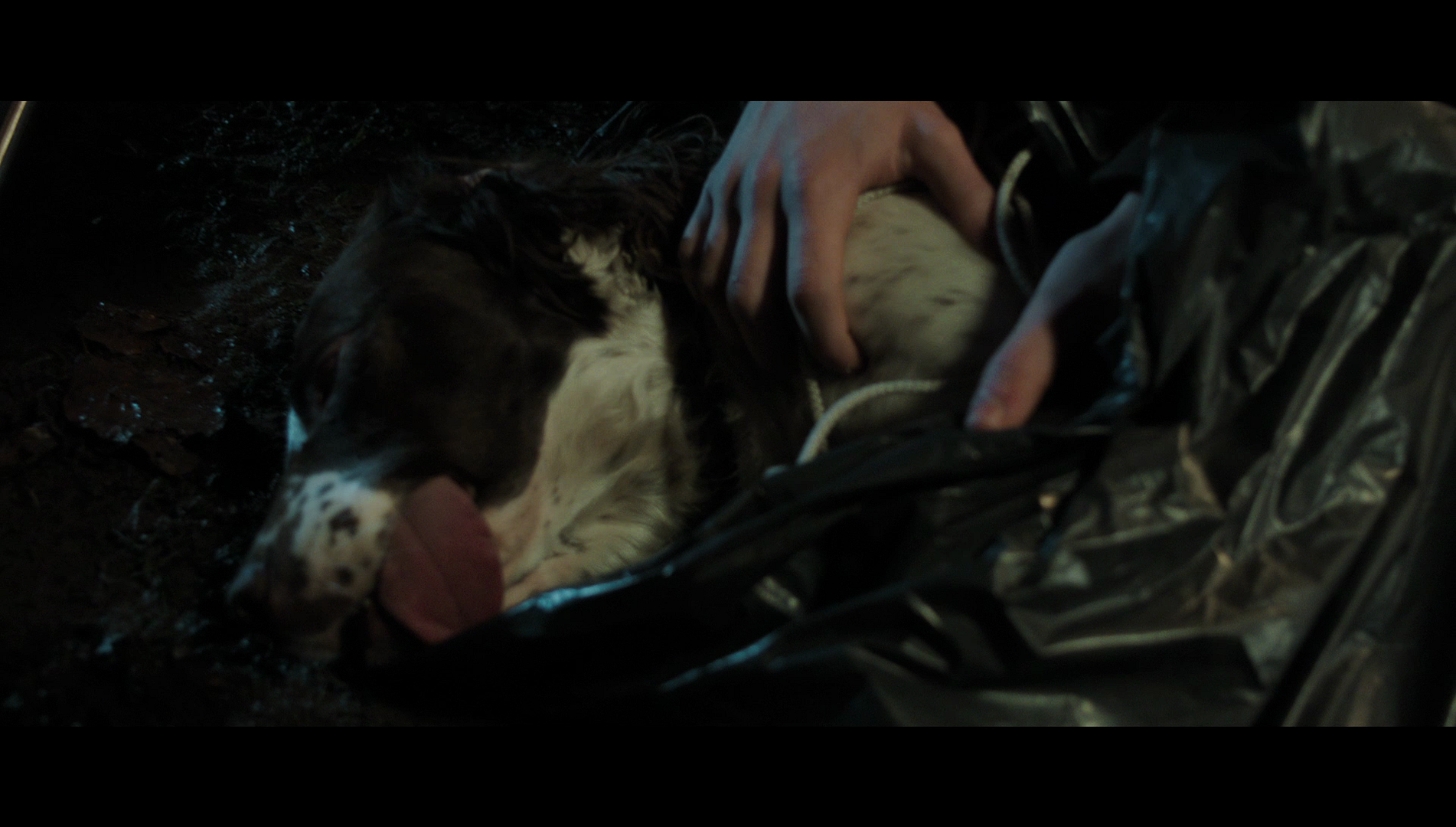 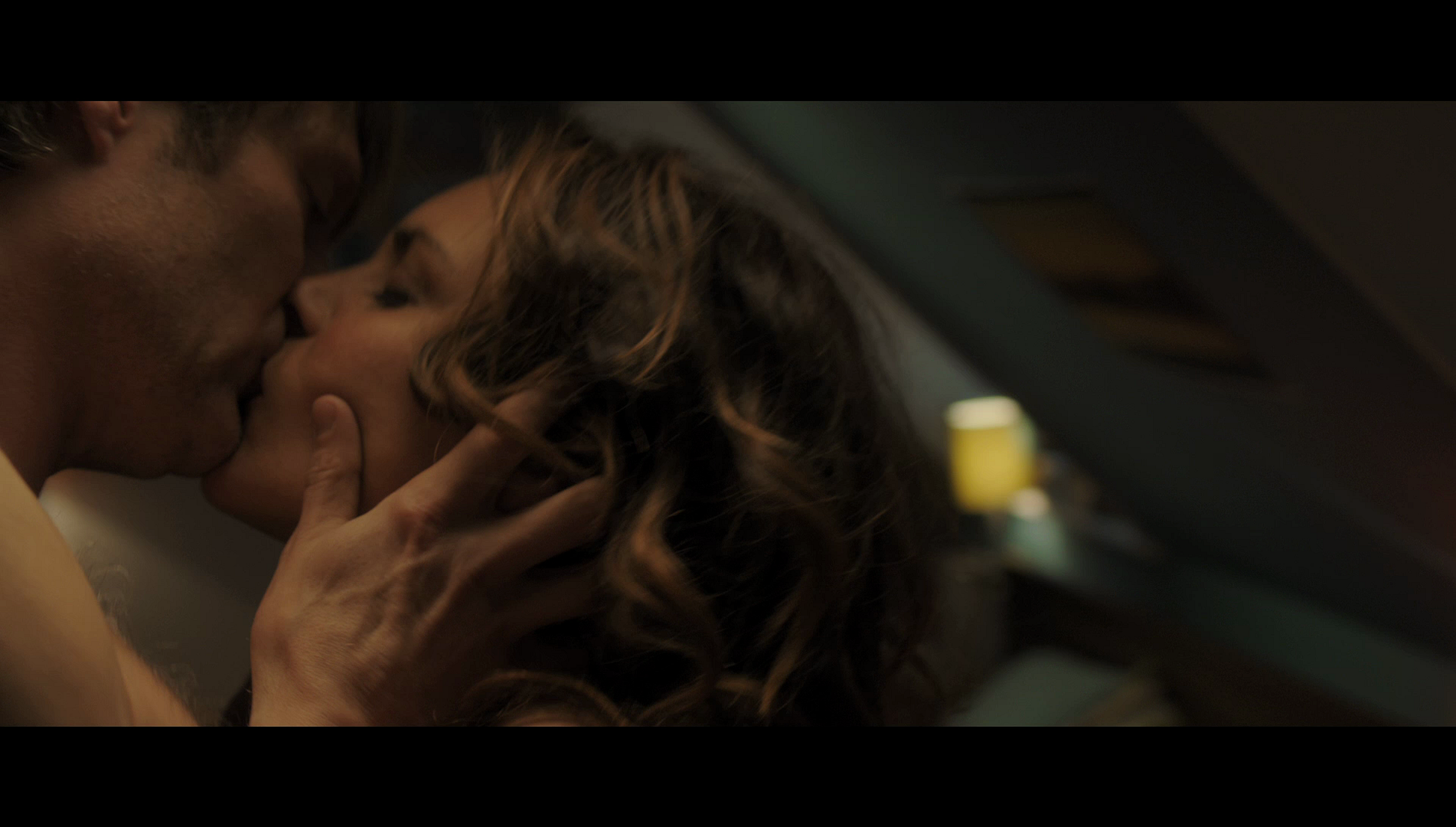
Audio
Dialogue is predominantly in Danish, with some English phrases here and there, and a little less Polish (from the character of Nadja). Non-English dialogue is presented with optional English subtitles, which are easy to read and free from grammatical errors. The film is presented with the option of a DTS-HD MA 5.1 track and a LPCM 2.0 stereo track. The former is preferable, being richer and making good use of sound separation at times. However, neither audio track is problematic.
Extras
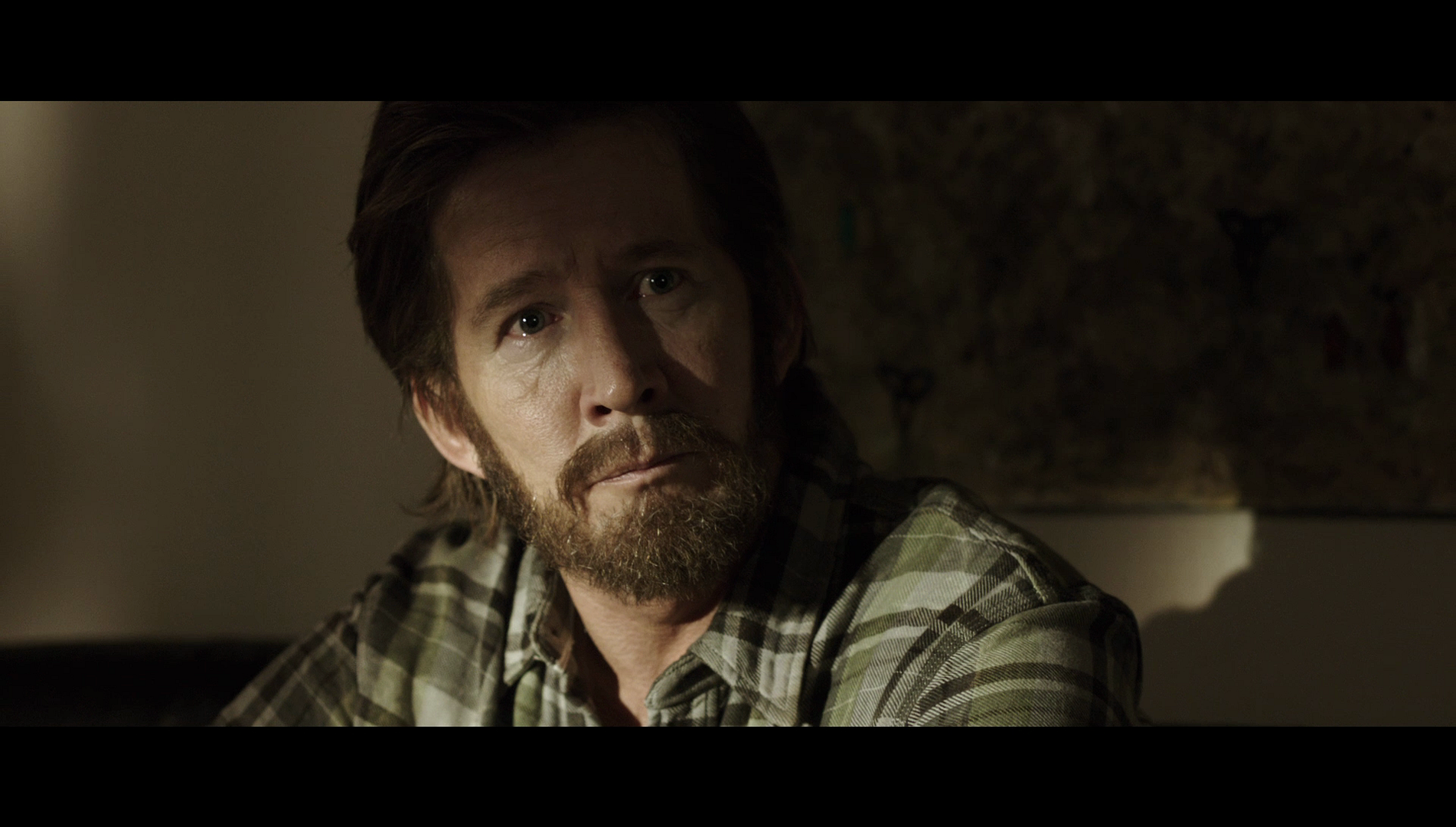 The disc includes the following extras: The disc includes the following extras:
- A ‘making of’ featurette (7:00). Clips from the film are intercut with interviews with Vinterberg and Mikkelsen. The interviewees speak in English. - A compilation of outtakes, deleted and extended scenes (12:24). This collection of additional scenes, including one which puts a very different spin on the relationship between Theo and his wife Agnes, is an interesting addition though it’s easy to see why these fragments weren’t included in the finished film. Danish with English subtitles. - An alternate ending (1:29). Without revealing too much, this alternate ending – brief as it is – offers a rather different conclusion to the film’s narrative. Danish with English subtitles. - The film’s trailer (2:03).
Overall
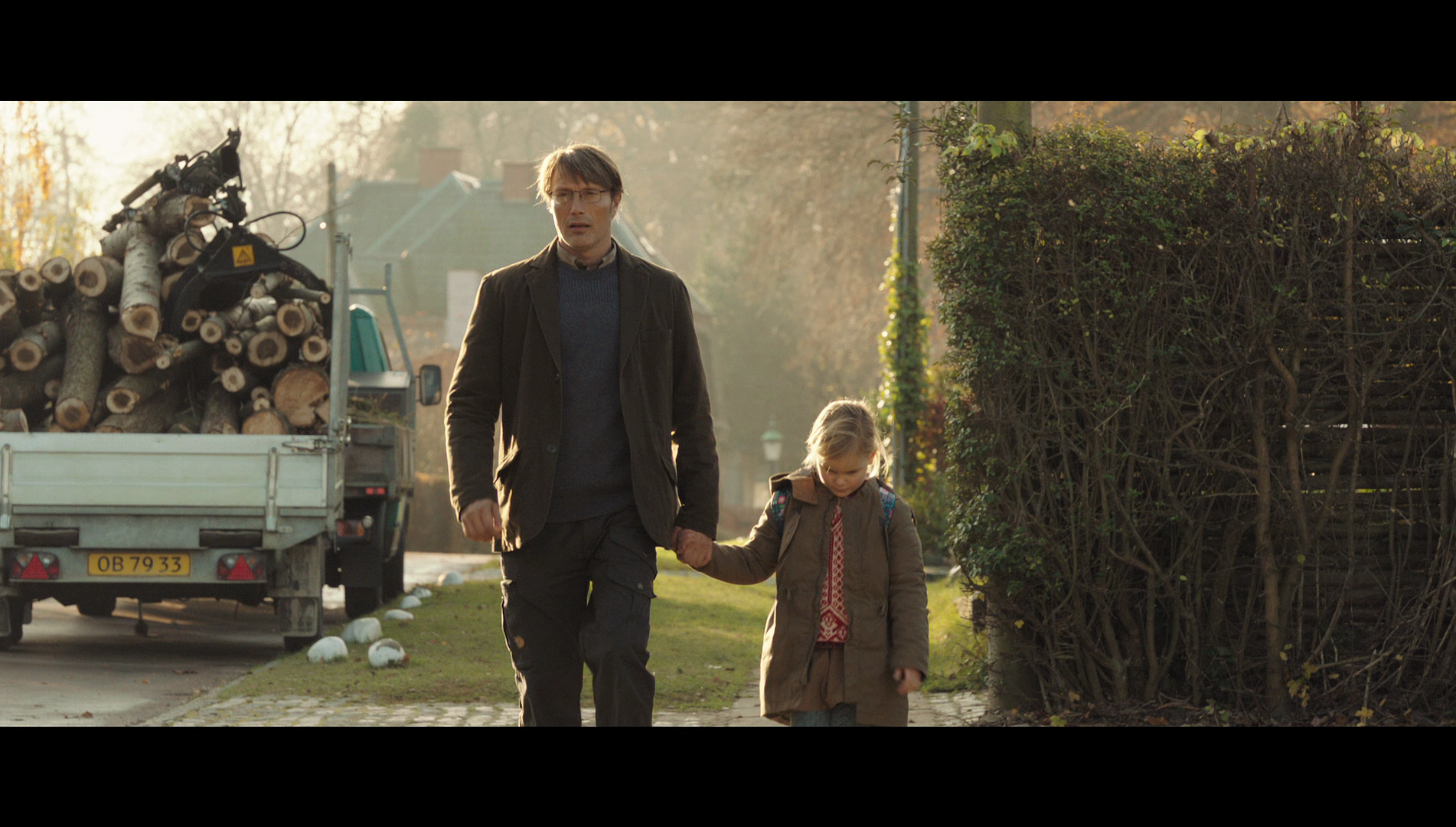 The Hunt was previously released on Blu-ray by Arrow films in 2013. In terms of both presentation and contextual material, this new release from Arrow Academy improves on the Blu-ray released previously in the UK, which was barebones aside from the film’s trailer. The old UK Blu-ray release also presented the main feature in 1080i50, whereas Arrow Academy’s new Blu-ray corrects this with a ‘proper’ 1080p transfer. The Hunt was previously released on Blu-ray by Arrow films in 2013. In terms of both presentation and contextual material, this new release from Arrow Academy improves on the Blu-ray released previously in the UK, which was barebones aside from the film’s trailer. The old UK Blu-ray release also presented the main feature in 1080i50, whereas Arrow Academy’s new Blu-ray corrects this with a ‘proper’ 1080p transfer.
The film itself is exceptionally good: slow-burning, it explores the hysteria associated with allegations of child sexual abuse, and extends this into an examination of the mentality created by, and behind, a witch-hunt. The film seems indebted to Arthur Miller’s The Crucible, though the similarities could simply be incidental. Nevertheless, it’s a powerful picture held together by some beautiful photography and a very good performance from Mikkelsen. This new Blu-ray release from Arrow Academy rectifies the problems associated with the older UK Blu-ray release of the film, giving us a proper 1080p presentation of the main feature alongside some excellent contextual material. References: Brooks, Xan, 2012: ‘Thomas Vinterberg – back in The Hunt’. The Guardian (22 November, 2012). [Available Online.] https://www.theguardian.com/film/2012/nov/22/thomas-vinterberg-the-hunt-festen 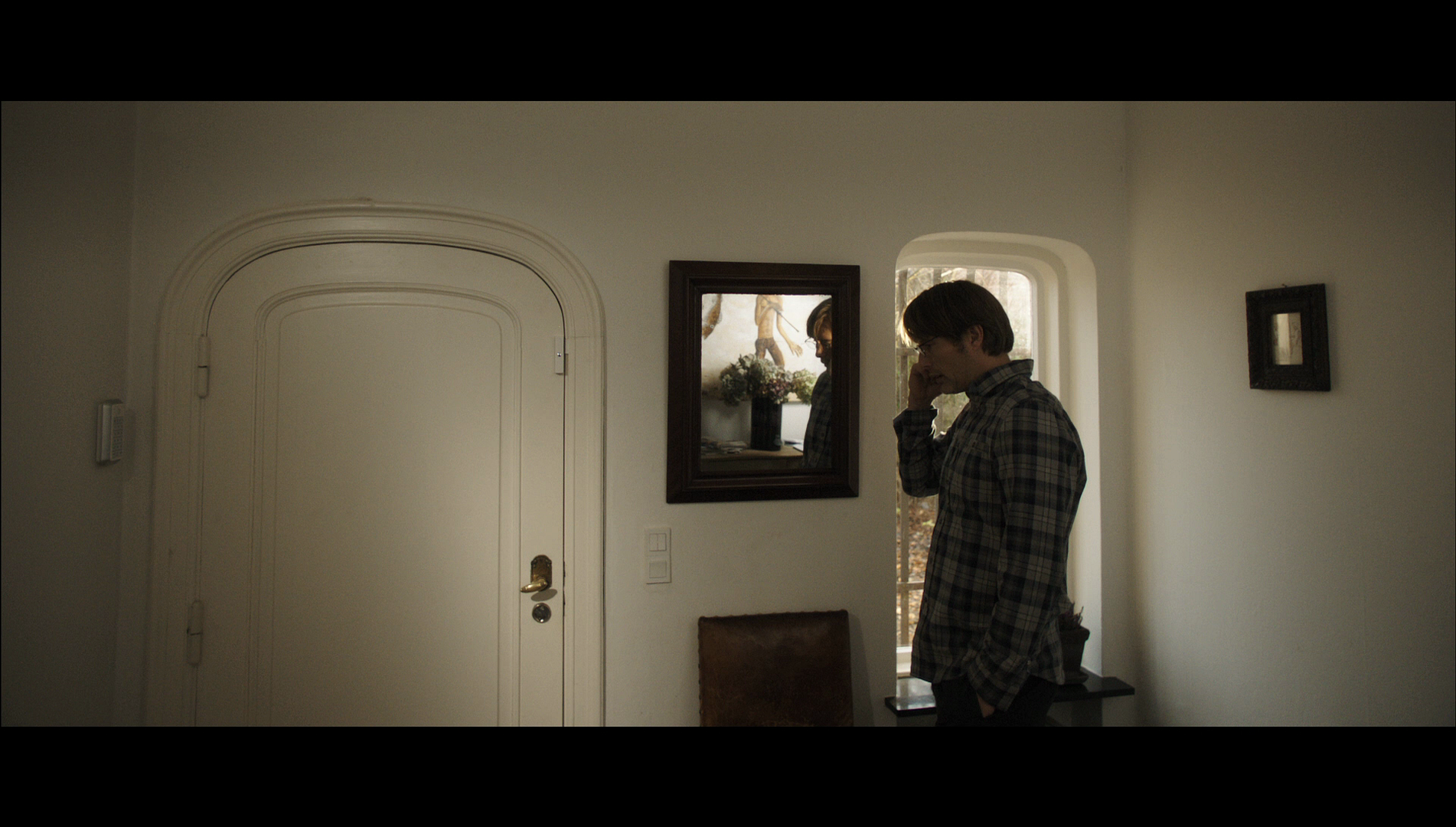
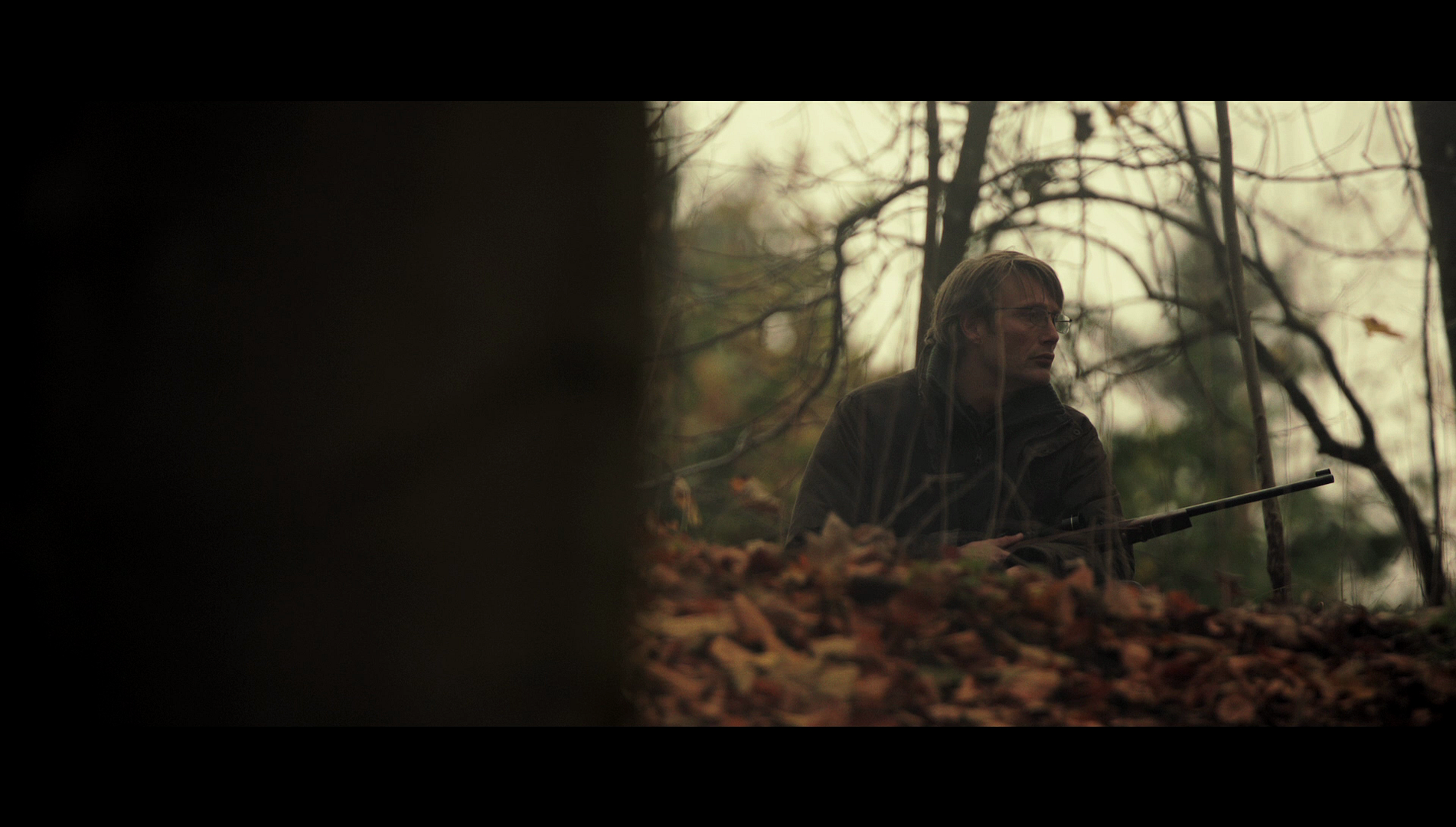
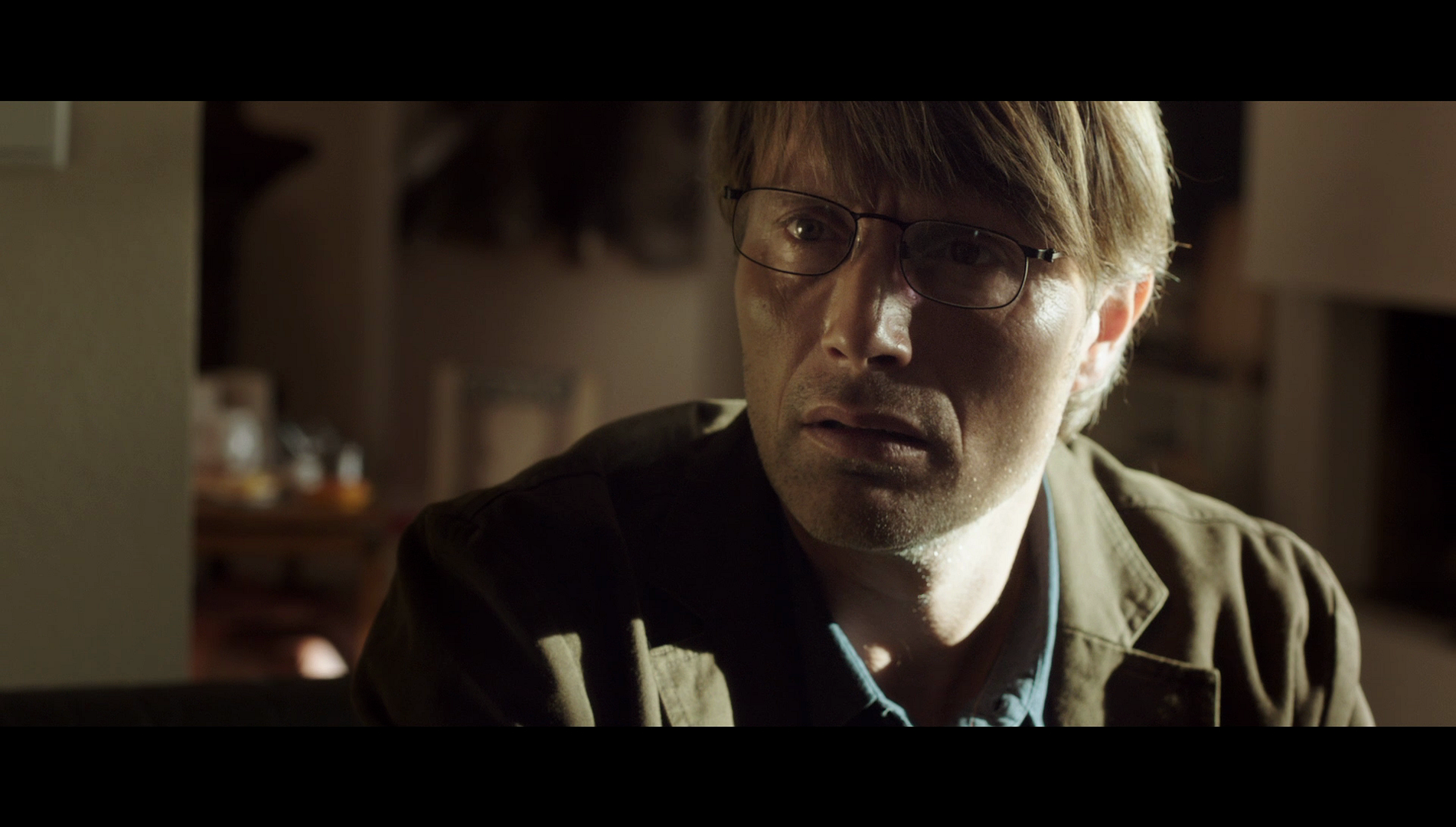
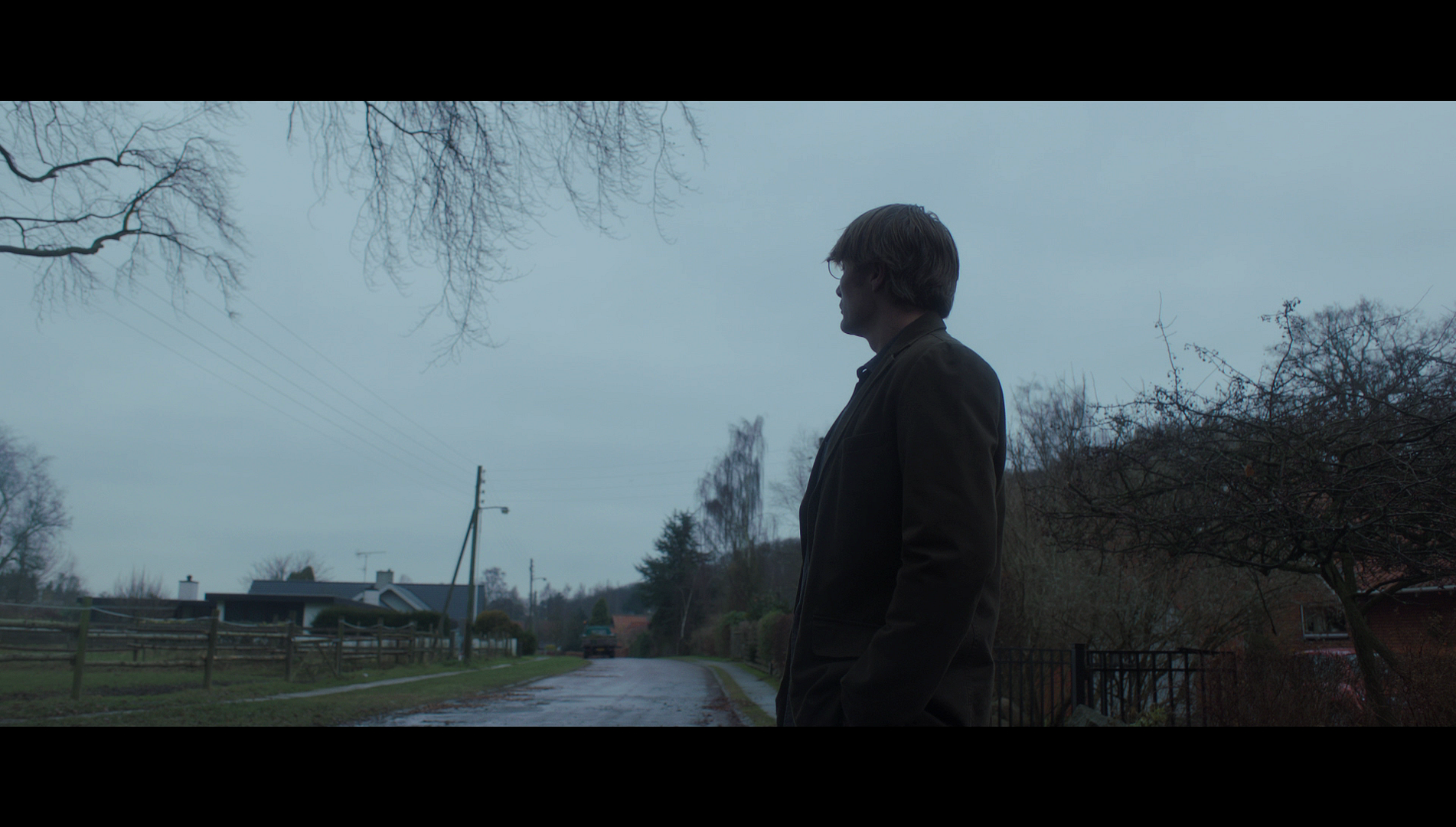
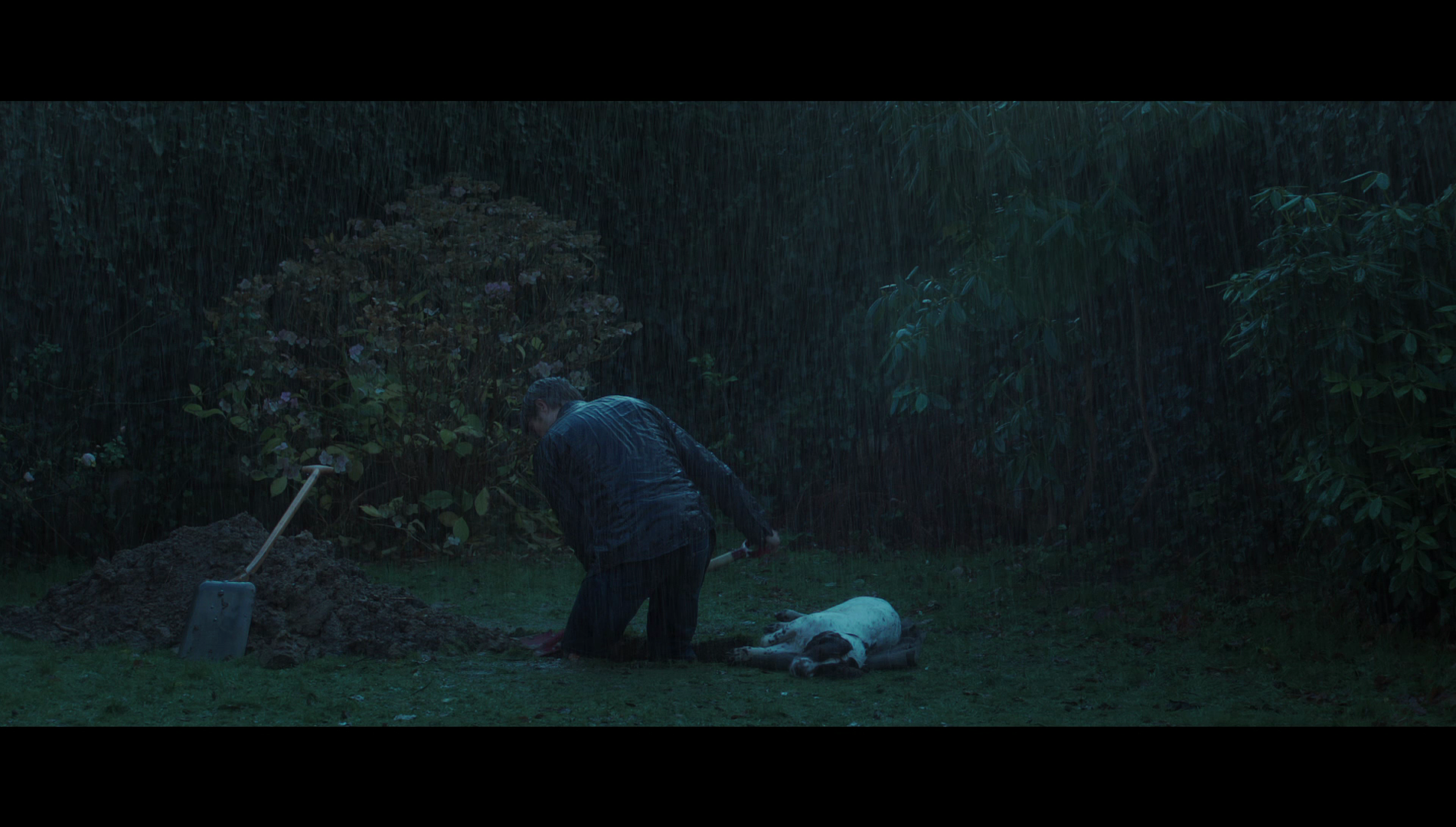
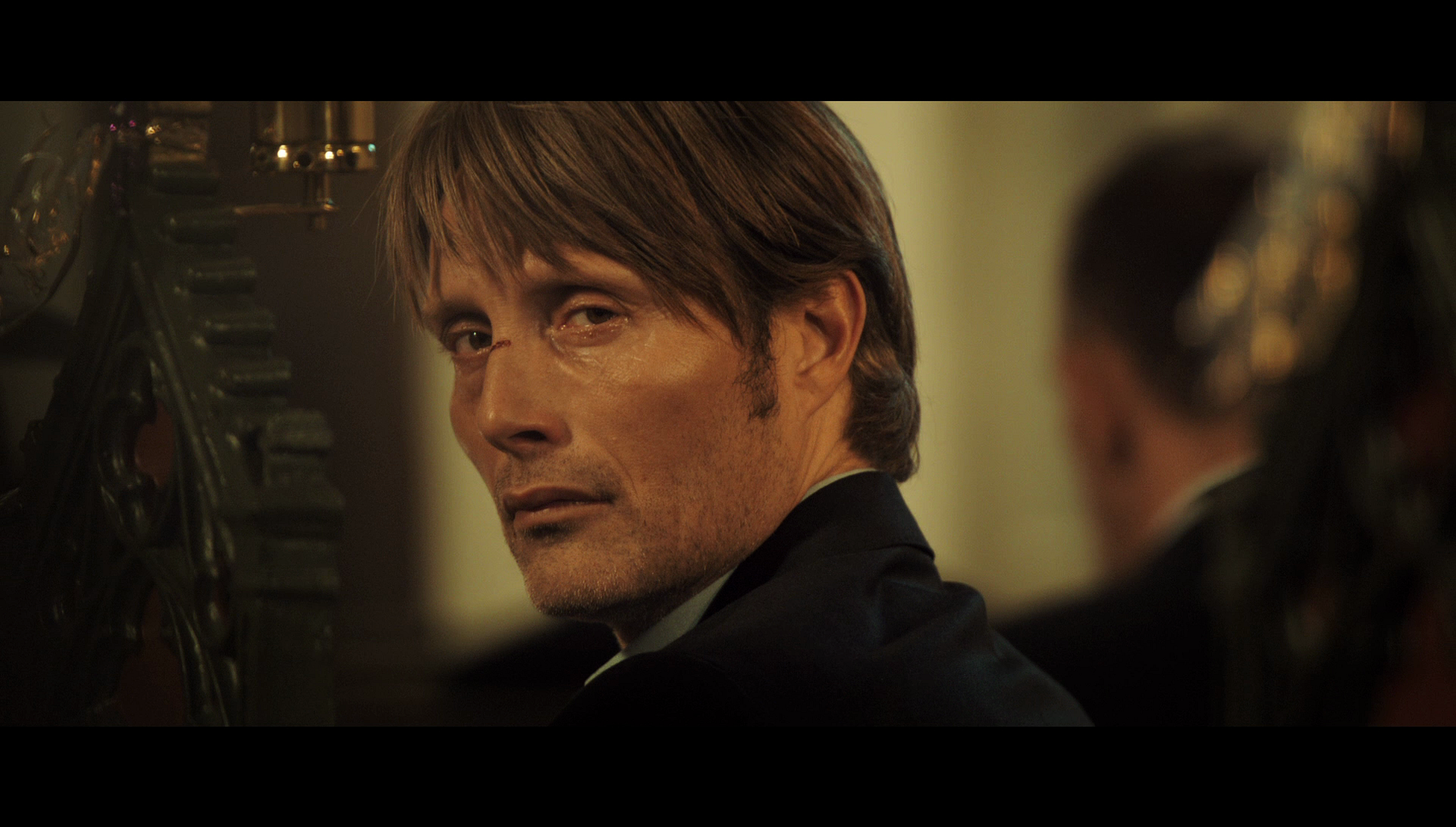
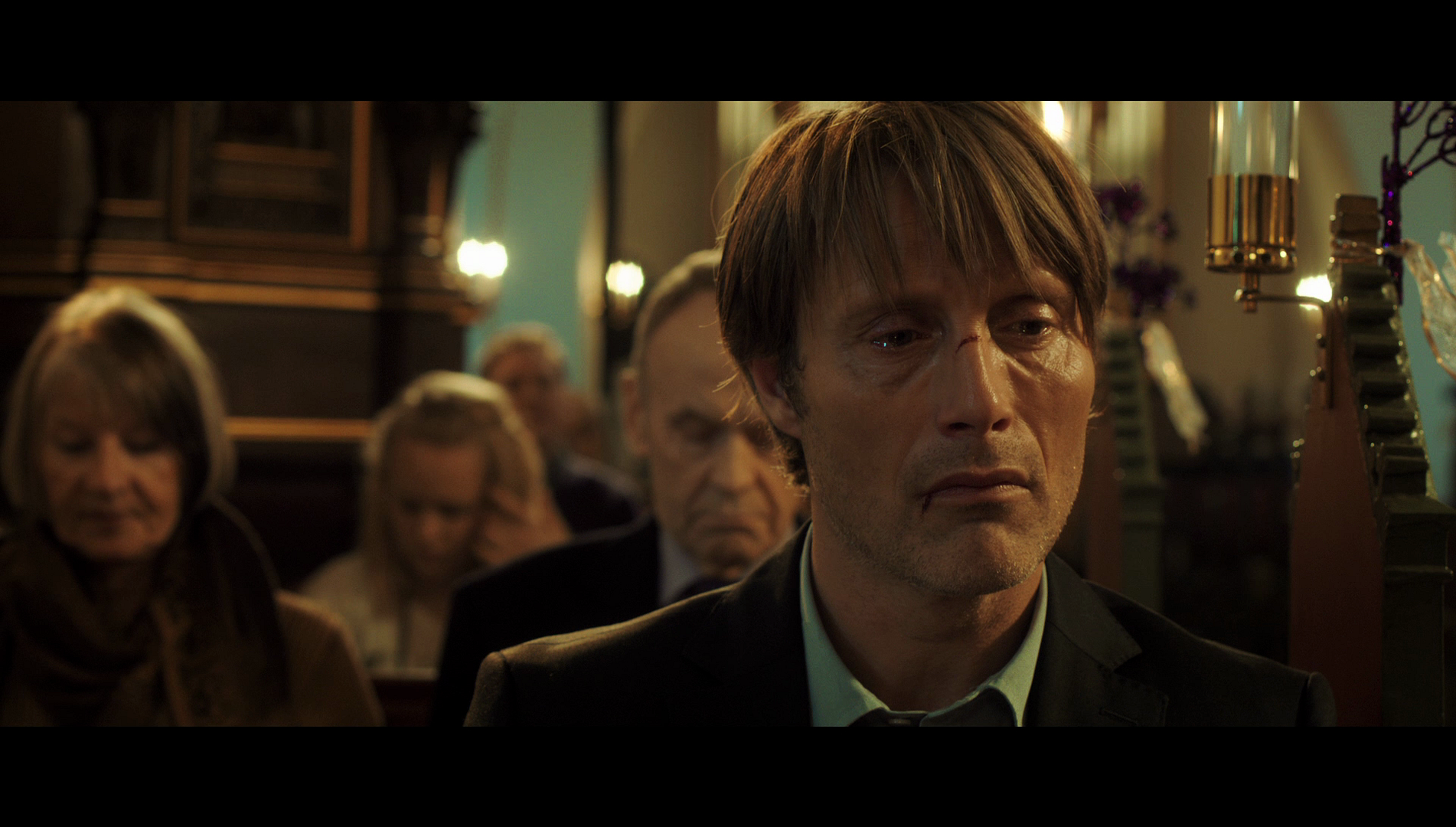
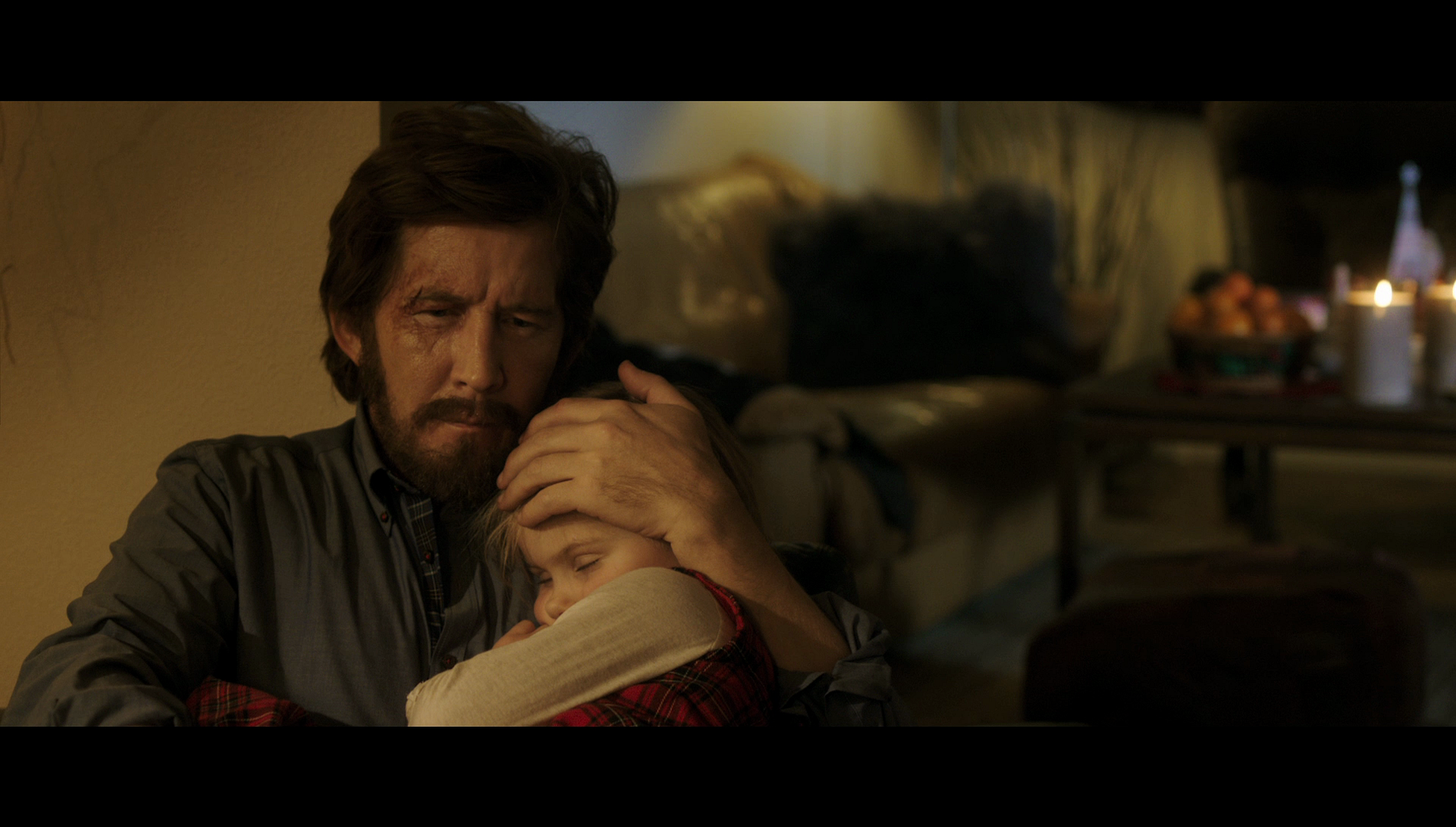
|
|||||

|